Liverpool’s defending was indefensible against Atalanta.
Conceding three times left hopes of winning the Europa League dangling by the thinnest of threads and also brought to the forefront bigger problems that could derail their Premier League title challenge too.
European comebacks are a Liverpool speciality, including incredible nights under Jurgen Klopp. Yet, if his side have a chance of turning around the 3-0 deficit, they will probably need to keep a clean sheet.
After the 3-0 defeat to Barcelona in the 2019 Champions League semi-final first leg, Liverpool famously won the second leg 4-0 to go through. Despite being ridiculed after the game, the Spanish side’s tweet below was valid.
We score, Liverpool need FIVE – and we’re going to get at least one… agreed?
🔵🔴 #LFCBarça (1-0, agg 1-3) pic.twitter.com/MX2fCNPynn— FC Barcelona (@FCBarcelona) May 7, 2019
While attacking solutions will also be required and away goals have been abolished, the biggest concern is Liverpool have not kept a clean sheet in their past eight matches. Their last came in the 1-0 victory over Nottingham Forest on March 2 — nearly a month and a half ago.
Defensive deficiencies are not a new problem. Since the start of 2024, Liverpool have kept just five clean sheets from 22 matches in all competitions.
Comebacks have been a theme throughout the campaign but to fashion them means you will have had to concede at least once. In 31 Premier League games, they have kept nine clean sheets, the same as Manchester City but five fewer than Arsenal (14) who have the most in the division.
In this current eight-game stretch, the numbers collectively are not as bad as it seems. Liverpool have allowed an expected goals (xG) against total of above 1.0 in only three of those games — although that includes the Manchester United FA Cup game across 120 minutes (3.93) and Atalanta (3.22).
Virgil van Dijk has returned to the peak of his powers again this season, but he can only do so much. Joe Gomez and Ibrahima Konate have enjoyed impressive campaigns, too, while youngsters Conor Bradley and Jarell Quansah have been welcome surprises.
The emergence of the latter two, however, has highlighted the issues Liverpool have had with the fitness of their defenders this season. The back four against Atalanta of Gomez, Konate, Van Dijk and Kostas Tsimikas was the 31st different combination Klopp has selected this season. No quartet has featured more than four times together, and none more than twice consecutively.
Liverpool’s most used back-four combinations in 2023-24
| Combination | Starts |
|---|---|
|
Alexander-Arnold – Konate – Van Dijk – Tsimikas |
4 |
|
Bradley – Konate – Van Dijk – Gomez |
4 |
|
Bradley – Quansah – Van Dijk – Gomez |
4 |
|
Alexander-Arnold – Matip – Van Dijk – Tsimikas |
3 |
|
Alexander-Arnold – Konate – Van Dijk – Gomez |
3 |
|
Alexander-Arnold – Konate – Van Dijk – Robertson |
2 |
|
Alexander-Arnold – Matip – Van Dijk – Robertson |
2 |
|
Gomez – Matip – Van Dijk – Robertson |
2 |
|
Gomez – Matip – Quansah – Tsimikas |
2 |
|
Gomez – Quansah – Van Dijk – Tsimikas |
2 |
|
Bradley – Konate – Van Dijk – Robertson |
2 |
It has been no surprise, then, that miscommunications have occurred. The most obvious example came against Manchester United in the FA Cup. With Gomez and Quansah playing right-back and centre-back respectively — a combination that has only occurred on four occasions — United’s attacking situation caused the pair to switch positions.
However, with Marcus Rashford in possession, both went towards the ball, allowing Alejandro Garnacho to run in behind.
His shot was parried but Scott McTominay followed it up to score.
The three goals against Atalanta were all different but highlighted some recurring themes.
The opening goal came from an unnecessary Tsimikas press.
He vacated the left channel and the Italian side took advantage of the space, drawing Van Dijk out…
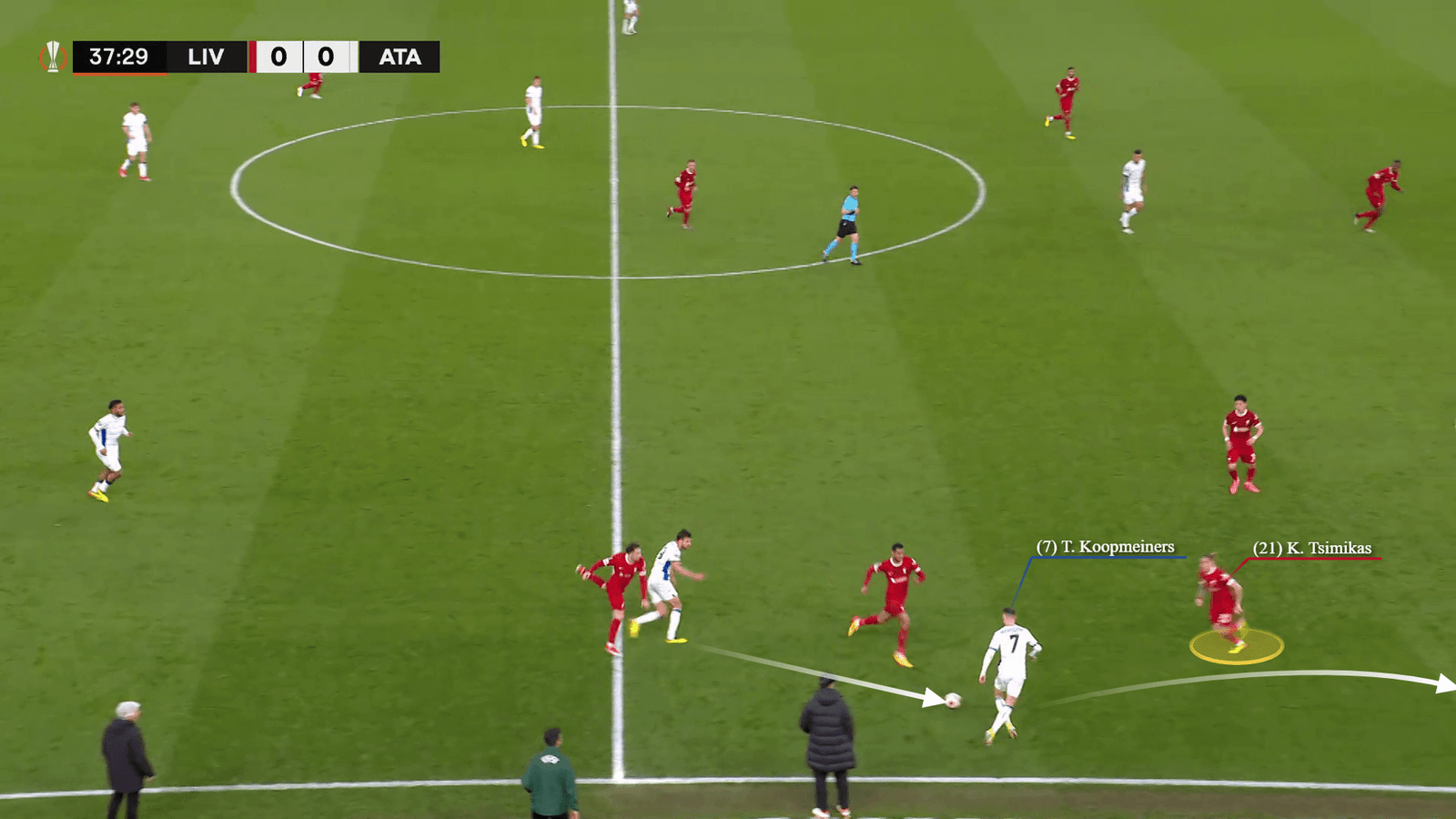
… and Davide Zappacosta found an unmarked Gianluca Scamacca in the centre.
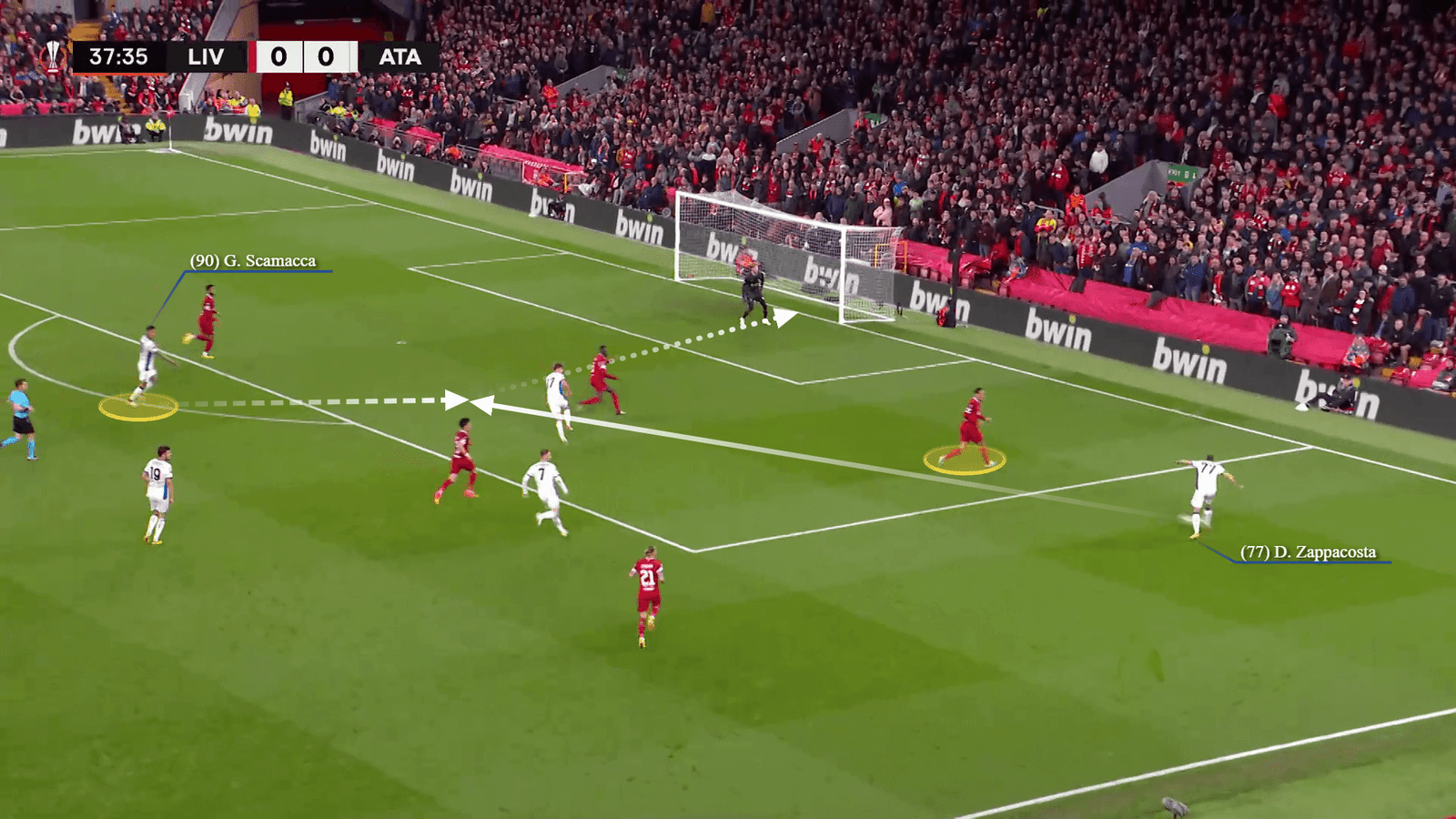
The second goal followed a similar pattern, with Atalanta exposing the space vacated, in this instance, by substitute Andy Robertson.
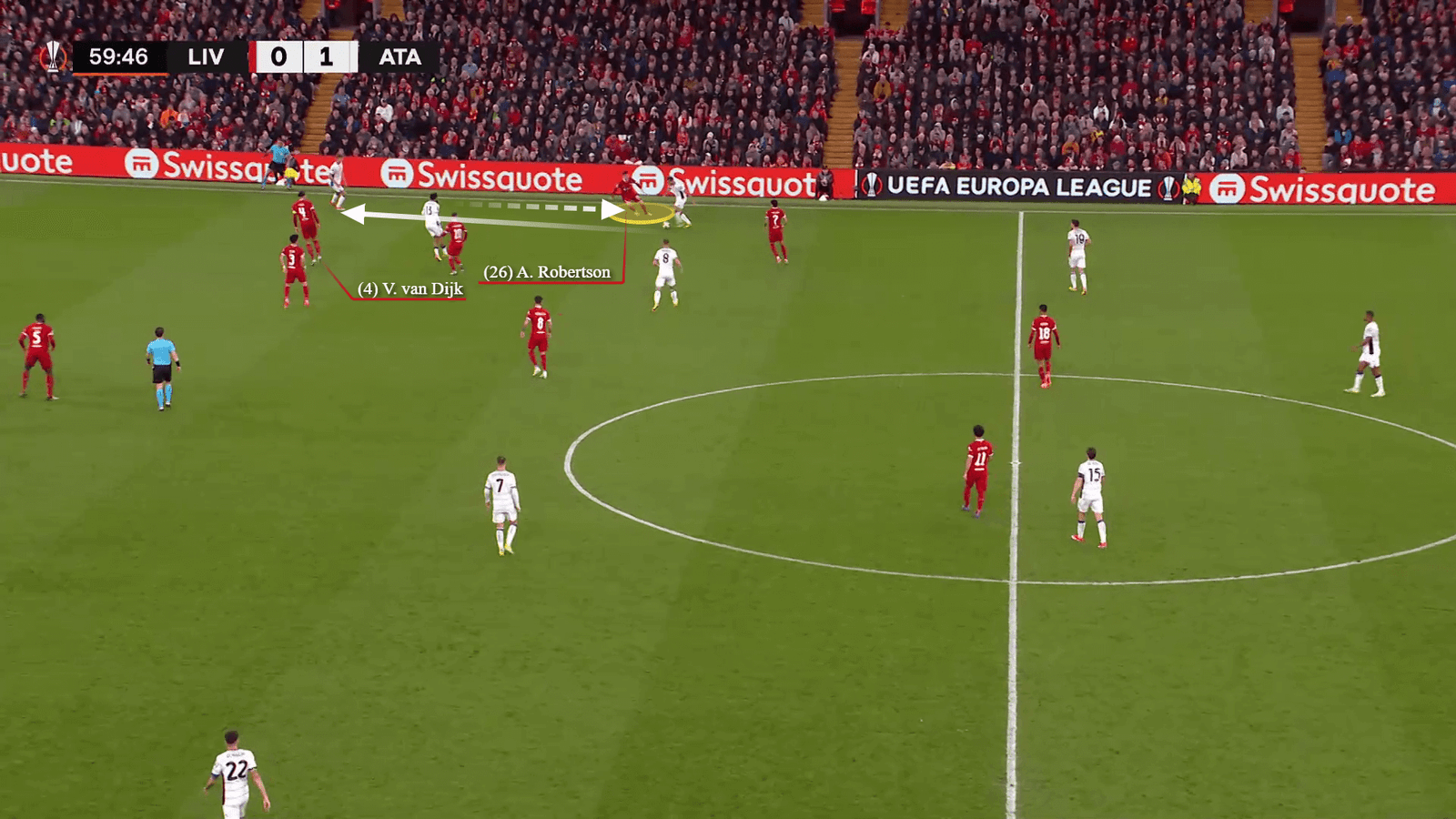
Neither Konate nor Gomez were alert to react, suggesting a lack of communication, and the cross was early enough so neither could recover. Scamacca had a simple finish.
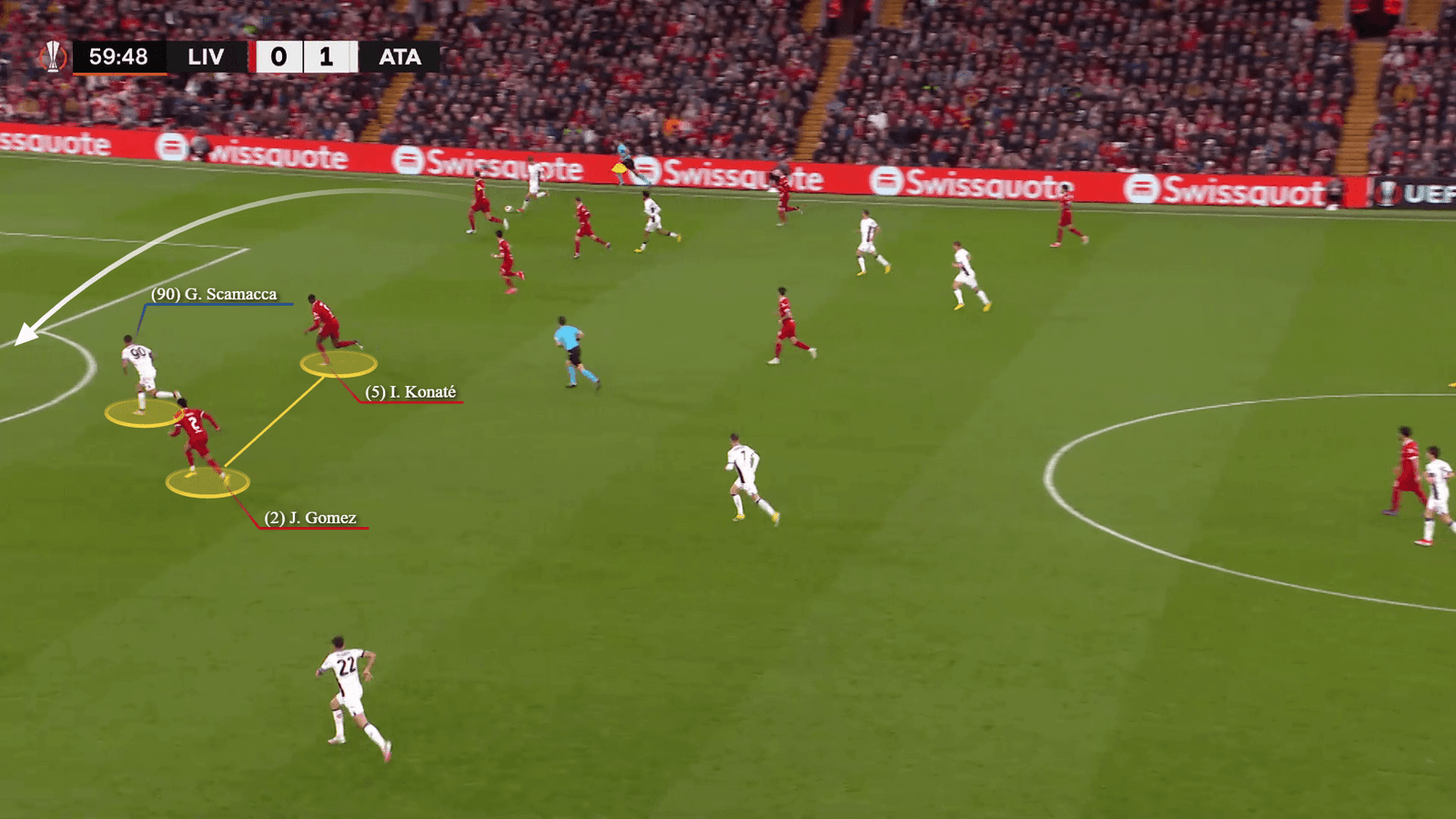
It was lethargic defending from all involved.
It was not too dissimilar to Sheffield United’s goal against Liverpool last week, where Klopp’s were caught out down their left-hand side…

… and did not pick up the runners entering the box, with Gustavo Hamer’s header directed goalwards via a deflection off Bradley.
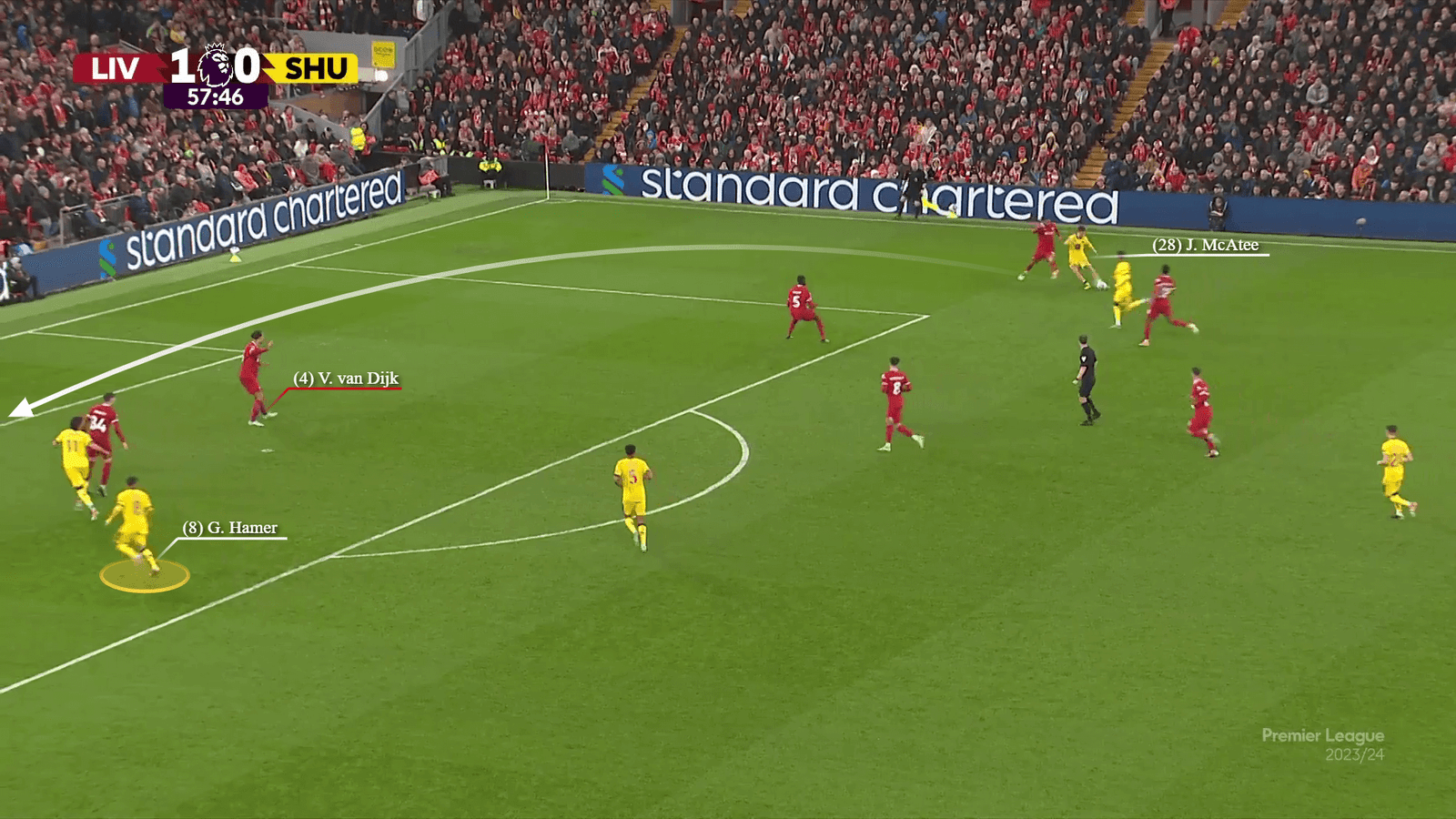
Individual mistakes are not helping. Dominik Szoboszlai was the latest culprit, with his underhit pass to Konate putting Liverpool on the back foot in their own half — leading to Atalanta’s third goal.
It can be added to the list of costly errors. Quansah’s pass straight to Bruno Fernandes led to Manchester United scoring from their first shot of the game, early in the second half at Old Trafford.
In the FA Cup fixture between the two sides, Darwin Nunez…
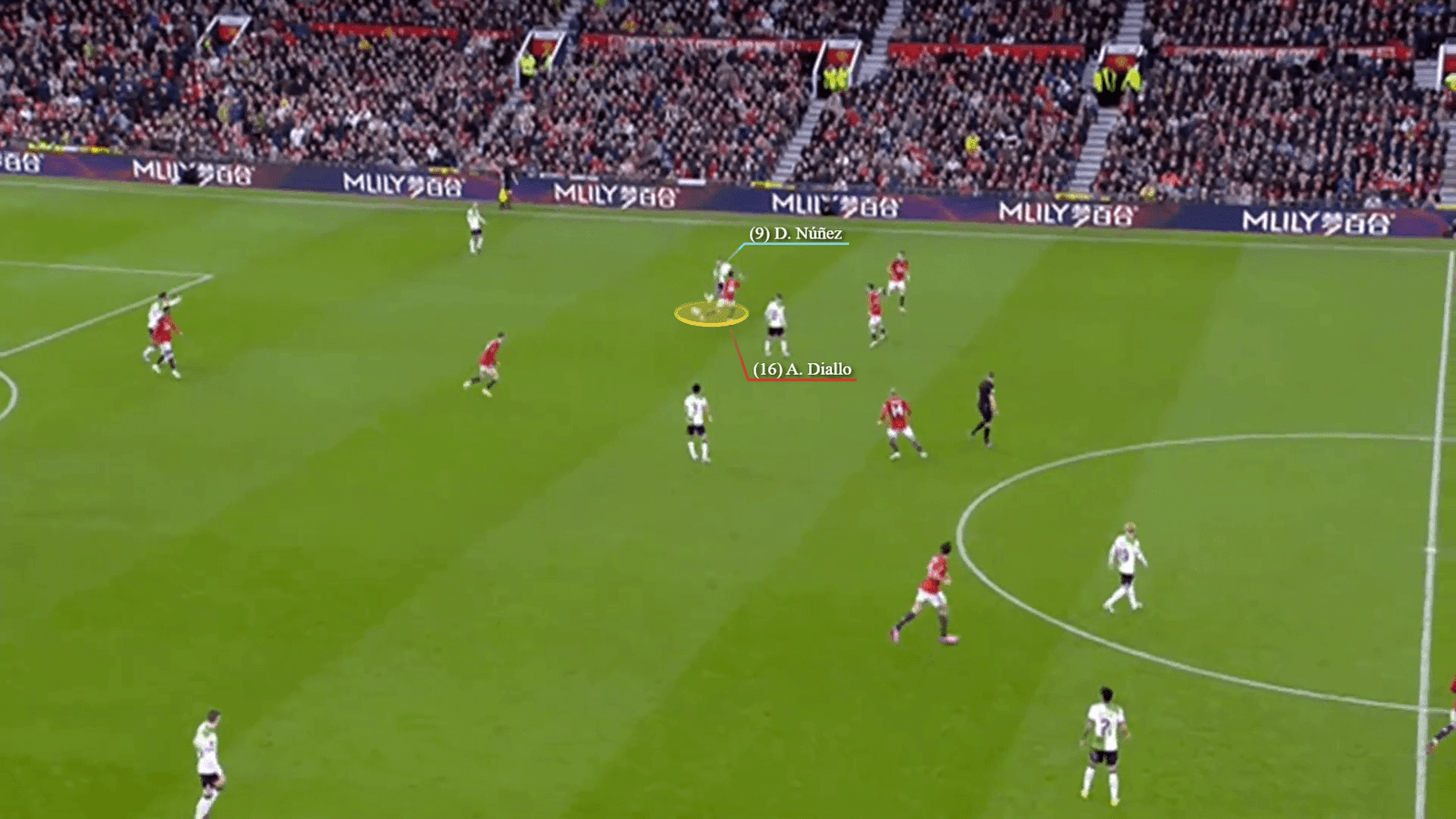
… and Harvey Elliott both made mistakes in possession that led to goals.
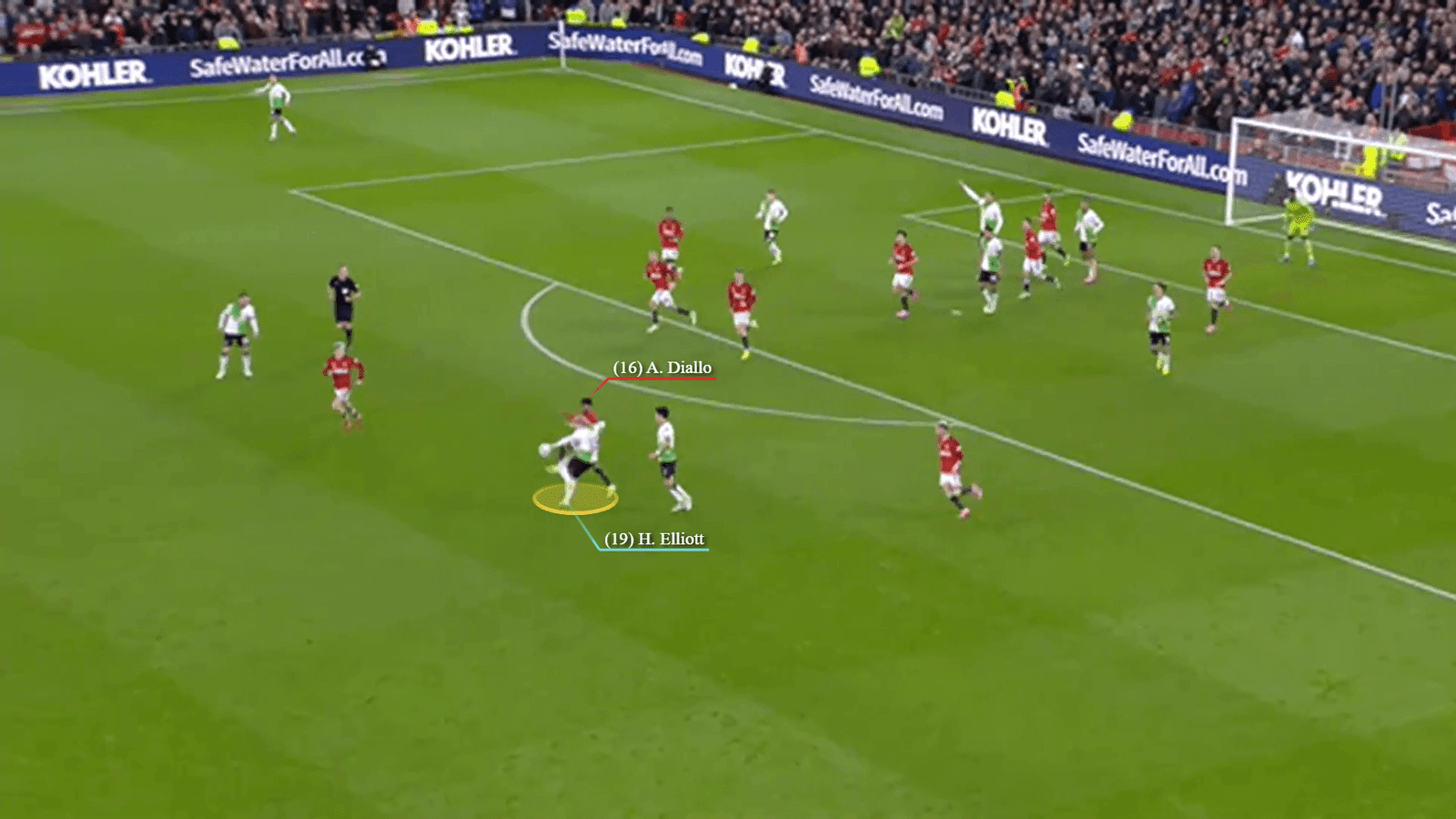
Bradley has also netted two own goals. The first, against Sparta Prague, was a misdirected attempted clearance. The second, against Sheffield United, was an unfortunate deflection he could do little about.
Stand-in goalkeeper Caoimhin Kelleher has now played more matches (26) than first-choice Alisson (24) in all competitions, with the Brazilian suffering a hamstring injury in February.
Kelleher has stepped up admirably in Alisson’s absence, making vital saves in big moments — including in the Carabao Cup final victory over Chelsea — to demonstrate why Liverpool value him as one of the best No 2 goalkeepers in Europe.
It was a mixed night for Kelleher, 25, against Atalanta. He made two crucial first-half saves including one with his face, but should have done better for Scamacca’s opener that went under his dive. For the third goal, he failed to parry Ederson’s effort to safety, allowing Mario Pasalic to tap home the follow-up.
Alisson returning for the run-in should provide a welcome boost. As well as Kelleher has done overall, overcoming the doubts against him earlier in the season, he is not Alisson — and the Brazil international makes a significant difference.
Regardless of who is in goal, Liverpool have to figure out how to start games without immediately coughing up a good chance.
Brighton & Hove Albion made them pay inside two minutes via Danny Welbeck’s strike, but it has become a common theme — especially in the last four games.
Manchester United scored an offside goal in the opening two minutes of their league fixture, while Kelleher made excellent saves from Sheffield United’s James MacAtee and Atalanta’s Scamacca — the latter with his face — in the opening minutes of their games.
Alongside Alisson, Trent Alexander-Arnold is ready to return, too; he was an unused substitute against Atalanta.
Liverpool’s vice-captain is often criticised for his defensive ability but he has taken an important step this season, shouldering more responsibility with his increased seniority in the dressing room.
Having missed nearly the entirety of 2024, his return should provide some much-needed experience and continuity both in and out of possession. He should offer a different level of control on the ball, making his side less susceptible to counter-attacks.
Klopp’s side have shown a soft defensive underbelly, one that they had corrected from last season. They have become too easy to score against and, personnel aside, that mentality has to change.
(Top photo: Jan Kruger – UEFA/UEFA via Getty Images)
Read the full article here


